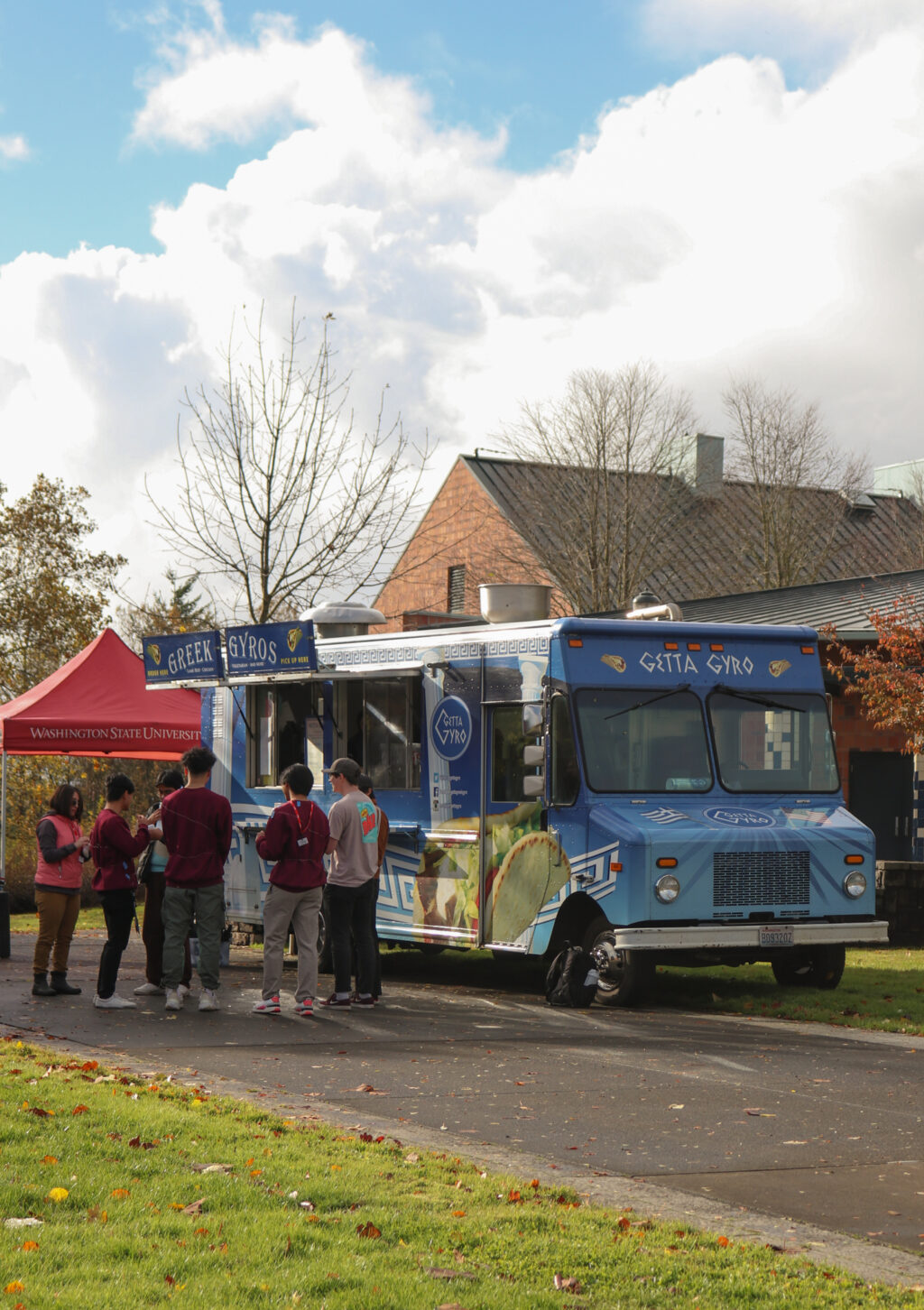The Associated Students of WSU Vancouver gathered nearly 400 signatures on a petition to host food trucks on campus, in an effort to expand the availability of food on campus. However, infrastructure problems and financial constraints make this task no easy feat.
“It will be more convenient for me and a lot of students, especially students who don’t have any vehicles to get food between classes.” – Isatou Dumbuya
Before the COVID-19 pandemic, the WSU Vancouver cafeteria provided students with freshly prepared meals. The post-pandemic Crave Cafe mainly serves packed lunches and frozen foods, leaving students with no fresh cooked food options on campus.
ASWSUV senator Noah Guerrero said the student government began to look for new food sources after students raised their concerns about the new cafeteria and its conditions.
“Just the fact that a student couldn’t get a hot meal, [that] the best thing you could get is ramen out of a microwave, that just wasn’t really acceptable to us,” Guerrero said.
In early October, the student government released a petition gauging student interest in food trucks. Guerrero said that Mexican and Mediterranean food were the top two requested types of food trucks. According to Guerrero, the petition implies a high-level of student interest in food trucks and can be used as an incentive for food truck owners.
“We had [roughly] 365 names, and that was over a course of two days. … We can take that data and go to the food trucks with it and say, ‘hey, we’ve got almost 400 names in two days. That’s a lot of names, there’s potential for a lot of money for you,’” Guerrero said.
Moses Meraz, a senior DTC student, said food trucks will positively impact campus life, as the current cafeteria does not offer a variety of food that caters to everyones’ unique tastes.
“A lot of people [could] expand their views … I know some people are closed off to certain things, but you know, trying something new is a pretty good mindset to have,” Meraz said. “People share an interest in food, so people could talk and maybe make new friends.”
According to Guerrero, Facilities Services and school staff have given ASWSUV approval to bring food trucks to campus, with some limitations. Facilities Services will require that the food trucks are self-sustainable and that they remain parked in a set of fixed locations whenever on campus.
“We mostly have the go-ahead. We have a couple of restrictions, like the locations of where we can put the food trucks are pretty fixed on exactly where they can park it. They haven’t given us the okay for providing power or water, which is one of the reasons why we’ve heavily leaned into food trucks rather than food stands,” Guerrero said.
In an email to The VanCougar, Bill Hooper, associate vice chancellor for facilities services, said self-supporting food trucks are much easier to bring to campus and would garner more support from the university.
“If a food truck was self-supporting and didn’t need utility connections for water, sewer and electricity it may simplify the discussion to, ‘where could it be parked and is that an acceptable location?’ Approval by campus leadership would still be needed, but it’s a much simpler discussion,” Hooper said.
With three parking spaces approved by facilities services, all that is left for ASWSUV is to find willing food trucks to serve students on a schedule. According to Guerrero, sourcing food trucks is a difficult process, as serving food on a public campus has restrictions. Specifically, getting food trucks in Portland to WSU Vancouver would require business owners to possess a Washington state business license.
“Portland is famously known for their food trucks. There’s hundreds of them … The moment you step into Washington, 90% of those food trucks go away because they don’t have a Washington business license,” Guerrero said. “We blazed through a lot of the initial process of getting permission from the school and facility operations, but finding a food truck that fits the needs of students has been really hard to find.”
According to senior DTC student Isatou Dumbuya, food trucks offer a diverse array of food to campus and are a convenient solution for students relying on public transportation to reach campus.
“I think the food trucks can [bring] a different variety, like Mediterranean, Mexican, Hispanic and African foods. … We need some diverse food,” Dumbuya said. “It will be more convenient for me and a lot of students, especially students who don’t have any vehicles to get food between classes.”
A food truck served free gyros to students at the Autumn Harvest Festival last month, and as the planning phase continues, ASWSUV is aiming for food trucks to begin serving students as soon as the spring semester of 2023.
“I absolutely love the student interest that’s been involved in this. When we were hosting the table for this, all we had to do was say ‘food trucks’ and 10 students would turn their heads and say ‘wait, what?’ There’s a wonderful interest in it. Some of these students had feedback, what they liked or didn’t like about the cafeteria … I think that’s really important. It shows that not only is it an interest to students, but that it can be really valuable in the future for growing our community,” Guerrero said. “There’s no community that exists that doesn’t have food as some sort of basis.”

Norman is a senior majoring in Integrated Strategic Communications and Digital Technology & Culture.
